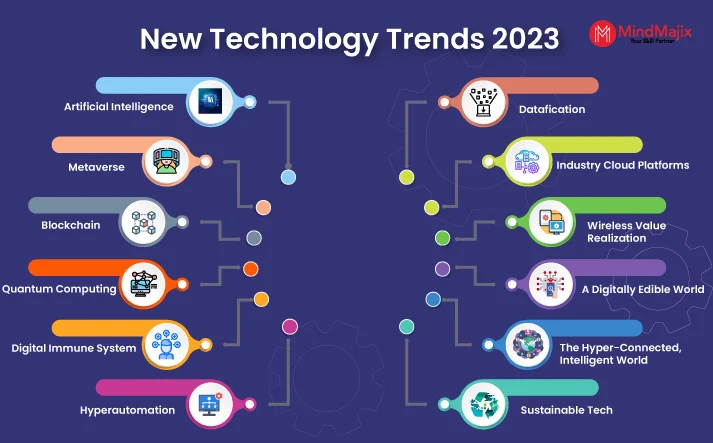Quantum computing represents a revolutionary leap in technology, promising to redefine the boundaries of what is computationally possible. Unlike classical computers that rely on bits as the smallest unit of data, quantum computers utilize qubits, which can exist in multiple states simultaneously. This fundamental difference allows quantum computers to process vast amounts of information at unprecedented speeds, making them a game-changer for various sectors, including cryptography, medicine, and artificial intelligence. In this article, we will delve into the implications of quantum computing and what it means for the future of technology.
As we explore the fascinating world of quantum computing, you will learn about its potential to solve complex problems that are currently beyond the reach of classical computers. We will discuss real-world applications, such as optimizing supply chains, enhancing drug discovery, and revolutionizing financial modeling. Additionally, we will examine the challenges and ethical considerations that come with this powerful technology. By understanding these aspects, you will gain insight into how quantum computing could reshape industries and impact our daily lives.
Join us on this enlightening journey as we uncover the transformative power of quantum computing. Whether you are a tech enthusiast, a business leader, or simply curious about the future of technology, this article will provide you with valuable knowledge and inspire you to think about the possibilities that lie ahead. Read on to discover how quantum computing is not just a concept of the future, but a reality that is already beginning to unfold.
Quantum computing represents a revolutionary shift in the way we process information. Unlike classical computers that use bits as the smallest unit of data, quantum computers utilize qubits, which can exist in multiple states simultaneously. This fundamental difference allows quantum computers to perform complex calculations at unprecedented speeds, opening up new possibilities for various fields.
The Basics of Quantum Computing
Understanding the fundamentals of quantum computing is essential for grasping its potential impact on technology. Quantum computers leverage the principles of quantum mechanics, such as superposition and entanglement, to perform calculations. Superposition allows qubits to represent both 0 and 1 at the same time, while entanglement enables qubits that are entangled to be correlated with each other, regardless of the distance separating them.
This unique behavior of qubits means that quantum computers can process vast amounts of data simultaneously, making them particularly powerful for tasks such as optimization, cryptography, and complex simulations. As researchers continue to explore the capabilities of quantum computing, we are beginning to see its potential applications in various industries.
Quantum Computing and Cryptography
One of the most significant implications of quantum computing is its potential to disrupt current cryptographic systems. Classical encryption methods, such as RSA and ECC, rely on the difficulty of factoring large numbers or solving discrete logarithm problems. However, quantum computers can efficiently solve these problems using algorithms like Shor’s algorithm, which poses a threat to traditional encryption methods.
This has led to the development of post-quantum cryptography, which aims to create encryption methods that are secure against quantum attacks. As quantum computing technology advances, it is crucial for organizations to adopt new cryptographic standards to protect sensitive information from potential breaches.
Quantum Computing in Drug Discovery
The pharmaceutical industry stands to benefit immensely from quantum computing, particularly in the field of drug discovery. Traditional methods of simulating molecular interactions are computationally intensive and time-consuming. Quantum computers can model complex molecular structures and interactions at a level of detail that classical computers cannot achieve.
By utilizing quantum algorithms, researchers can identify potential drug candidates more quickly and accurately, significantly reducing the time and cost associated with bringing new drugs to market. This could lead to breakthroughs in treating diseases that currently have limited treatment options.
Quantum Computing and Artificial Intelligence
Quantum computing has the potential to enhance artificial intelligence (AI) by enabling faster data processing and more complex algorithms. Machine learning, a subset of AI, often requires vast amounts of data and computational power to train models effectively. Quantum computers can process this data more efficiently, allowing for the development of more sophisticated AI models.
Furthermore, quantum algorithms can improve optimization problems commonly encountered in AI, such as feature selection and hyperparameter tuning. As quantum technology matures, we may see significant advancements in AI capabilities, leading to more intelligent systems that can solve complex problems.
Quantum Computing in Financial Services
The financial services industry is exploring the use of quantum computing for various applications, including risk analysis, portfolio optimization, and fraud detection. Quantum algorithms can analyze large datasets and identify patterns that would be difficult for classical computers to detect.
By leveraging quantum computing, financial institutions can make more informed decisions, optimize trading strategies, and enhance their ability to detect fraudulent activities. As the technology evolves, it could lead to a more efficient and secure financial ecosystem.
Challenges and Limitations of Quantum Computing
Despite its potential, quantum computing faces several challenges that must be addressed before it can be widely adopted. One of the primary issues is qubit coherence, as qubits are highly sensitive to their environment and can lose their quantum state through a process known as decoherence.
Additionally, building scalable quantum computers is a significant engineering challenge. Researchers are exploring various qubit technologies, such as superconducting qubits and trapped ions, to find the most effective solutions. Overcoming these challenges will be crucial for realizing the full potential of quantum computing.
The Future of Quantum Computing
The future of quantum computing is promising, with ongoing research and investment from both public and private sectors. As technology advances, we can expect to see more practical applications emerge across various industries. Companies like IBM, Google, and Microsoft are actively developing quantum computing platforms and collaborating with researchers to push the boundaries of what is possible.
Moreover, educational initiatives are being established to train the next generation of quantum scientists and engineers, ensuring a skilled workforce to support this burgeoning field. The continued evolution of quantum computing will undoubtedly shape the future of technology in profound ways.
Conclusion: Embracing the Quantum Revolution
As we stand on the brink of a quantum revolution, it is essential for businesses, governments, and individuals to embrace the potential of quantum computing. By understanding its implications and investing in research and development, we can harness the power of quantum technology to solve some of the world’s most pressing challenges.
From enhancing cybersecurity to revolutionizing drug discovery and optimizing financial services, the applications of quantum computing are vast and varied. As we move forward, collaboration and innovation will be key to unlocking the full potential of this transformative technology.
| Aspect | Description |
|---|---|
| Definition | Quantum computing is a type of computation that utilizes quantum bits (qubits) to perform calculations at speeds unattainable by classical computers. |
| Principles | It is based on principles of quantum mechanics, including superposition and entanglement, allowing for parallel processing of information. |
| Potential Applications | Quantum computing has potential applications in cryptography, drug discovery, optimization problems, and complex simulations. |
| Impact on Cryptography | Quantum computers could break traditional encryption methods, necessitating the development of quantum-resistant algorithms. |
| Advancements in AI | Quantum computing could significantly enhance machine learning algorithms, leading to faster data processing and improved AI capabilities. |
| Challenges | Current challenges include qubit stability, error rates, and the need for low temperatures to maintain quantum states. |
| Future Outlook | As technology advances, quantum computing is expected to revolutionize industries, leading to breakthroughs in science, finance, and technology. |




